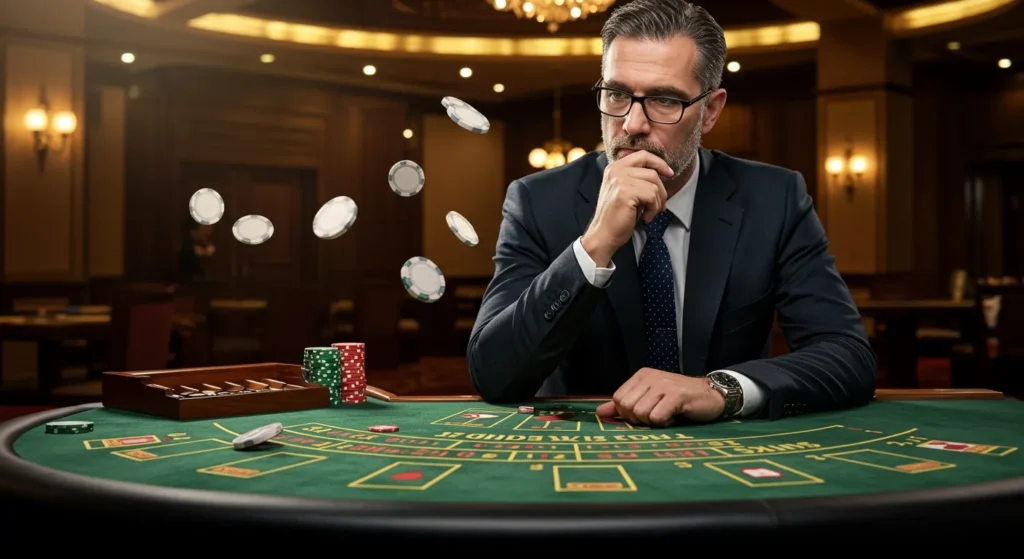Every gambler has asked this question at some point: can you really beat the house edge? It’s the eternal debate between luck and logic, between the thrill of chance and the mathematics of probability. Modern casinos—both physical and online—are built around this principle of advantage. The “house edge” is what ensures that, over time, the casino makes a profit. But does that mean it’s impossible for players to come out on top? The short answer is complicated: yes, you can win—but only in specific situations and for limited periods.
Understanding what the house edge is, how it works, and how players try to overcome it is key to becoming a smarter and more strategic gambler.
Understanding the House Edge
At its core, the house edge is a statistical advantage designed into every casino game. It represents the percentage of each wager that the casino expects to keep over time. For instance, in American roulette, the house edge sits around 5.26%. This means that for every $100 bet, the casino expects to retain $5.26 in profit over the long run. It’s not a trick or manipulation—it’s built into the rules.
The house edge ensures that while some players win big in the short term, the casino will always win in the long run. This is why casinos can afford to offer luxurious environments, loyalty programs, and even complimentary services—because the math is in their favor. But players who understand how this advantage works can learn to minimize it and sometimes even flip the odds temporarily.
The Rise of Non GamStop Casinos and Player Strategy
One interesting shift in the online gambling scene is the rise of non gamstop casinos, which operate outside the UK’s self-exclusion program. These platforms often attract experienced players looking for greater freedom in game selection, higher bonus offers, or alternative betting mechanics. They’re also known for featuring versions of classic games with slightly different rules—sometimes with lower house edges or promotional structures that make certain bets more favorable.
While these sites can offer opportunities for skilled players, they also come with added risks. Without UK regulation, the responsibility for fairness and transparency shifts more heavily onto the player. That said, legitimate international operators licensed under jurisdictions like Curaçao or Malta often maintain competitive standards. For players who know how to assess odds and apply discipline, such casinos can offer a more flexible playing field for testing strategies against the house edge.
Why Beating the House Is So Difficult
Modern casinos use a combination of mathematics, technology, and behavioral psychology to maintain their edge. Game algorithms, payout ratios, and even casino layouts are all designed to maximize long-term profitability. Take slot machines as an example—these are governed by random number generators (RNGs), ensuring that no spin is influenced by the previous one. While some players believe in “hot” or “cold” machines, the reality is that each outcome is independent, and the house edge remains intact over time.
Table games like blackjack, roulette, or baccarat offer better opportunities for strategy. However, even with perfect play, the odds rarely tip in favor of the player. The house always maintains at least a fractional advantage. For example, a skilled blackjack player using basic strategy can reduce the house edge to around 0.5%, but it never fully disappears.
Casinos also employ modern surveillance and anti-fraud technologies to prevent techniques like card counting or collusion. In the past, advantage players could exploit these weaknesses, but today’s systems are far more robust. The combination of mathematical design and real-time monitoring makes it extremely difficult to consistently overcome the house edge in any meaningful way.
Strategies That Minimize the House Edge
While “beating” the house might not be sustainable in the long term, there are ways to minimize its impact. The key lies in making informed decisions, not chasing luck. Games like blackjack, video poker, and certain roulette variations offer the lowest house advantages when played correctly.
Blackjack, for instance, rewards knowledge. Players who use optimal strategies—based on statistical probabilities for every hand—can reduce the house edge dramatically. Similarly, video poker variants like Jacks or Better, when played with a perfect pay table, can even bring the house edge down to nearly zero. But to do so requires discipline, patience, and an understanding of payout structures.
Craps also offers bets with low house edges, such as the “pass line” or “don’t pass” bets. The challenge is avoiding high-risk wagers with poor odds, which casinos often highlight to lure inexperienced players. Understanding which bets offer the best return can make a significant difference over time, even if it doesn’t guarantee consistent profits.
The most successful gamblers treat their approach like a form of risk management. They study payout percentages, limit emotional decision-making, and use bankroll control to survive variance. These methods don’t “beat” the house edge, but they make the experience far more strategic and potentially profitable in the short term.
Short-Term Wins vs. Long-Term Reality
One of the biggest misconceptions in gambling is that long-term success is achievable through persistence alone. The truth is that casino games are designed with statistical inevitability—if you play long enough, the house wins. That doesn’t mean you can’t walk away a winner after a few lucky sessions. The difference between a casual player and a losing one often comes down to timing and discipline.
Short-term variance, or luck, can temporarily tilt the odds in your favor. Slot jackpots, roulette streaks, or a hot blackjack table can all lead to remarkable wins. But those victories are fleeting by design. Over thousands of bets, the law of large numbers ensures that the house edge will reassert itself.
This is why professional gamblers approach the casino as a mathematical problem, not an emotional one. They know when to walk away. They also diversify their gameplay—taking advantage of promotions, loyalty rewards, and cashback offers that improve their expected value. These benefits don’t eliminate the house edge, but they help balance it over multiple sessions.
The Psychological Game: Why Players Keep Trying
Casinos don’t just rely on math; they also rely on human psychology. The environment itself—lights, sounds, near-misses, and constant stimulation—is designed to keep players engaged and hopeful. The concept of “losses disguised as wins,” especially in slots, keeps players spinning even when they’re technically losing money.
Online casinos have adapted similar tactics, with interactive animations and celebratory graphics even for small wins. It’s not manipulation—it’s conditioning. Understanding this psychological dimension is part of “beating” the system in your own way. Once you recognize the cues designed to keep you playing longer, you can take control of your behavior rather than playing on autopilot.
This is particularly important for players at non GamStop casinos or international platforms, where self-exclusion tools may not be as strict. Responsible gaming apps, time reminders, and bankroll limits can help maintain control while still allowing enjoyment of the games themselves.
Can Technology Help Players Win?
In recent years, some gamblers have turned to technology to improve their chances—using data trackers, betting algorithms, and statistical simulators. While these tools can help analyze betting patterns, they can’t override the built-in mathematical edge. Casinos use equally advanced systems to maintain fairness and prevent abuse. Even AI-assisted betting models can’t guarantee consistent wins because the randomness of outcomes remains unaltered.
That said, technology can help you make smarter decisions. Tools that analyze payout percentages or real-time volatility can inform which games offer the best return for your risk level. It’s not about outsmarting the system—it’s about understanding it better.
Final Thoughts: Is Beating the House Really Possible?
So, is it possible to beat the house edge in modern casinos? In the long term, no. The mathematics is absolute. Every game is designed so that over time, the casino keeps a small but undeniable profit margin. However, in the short term, with smart play, disciplined bankroll management, and a solid understanding of the games you choose, it’s possible to minimize that advantage and enjoy meaningful wins.
The trick isn’t to defeat the casino—it’s to understand its design well enough to make it work for you. By managing risk, exploiting promotions wisely, and walking away when ahead, you can experience the thrill of victory while still staying realistic about the odds.
In the end, the most successful players aren’t those who try to “beat” the house—they’re the ones who play with awareness, patience, and respect for the numbers that run the game.











